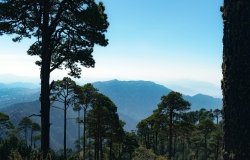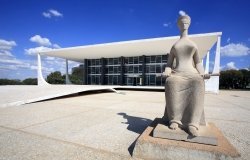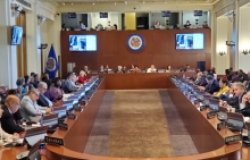President Iván Duque Márquez: Colombia’s Domestic and Regional Opportunities and Challenges
In this conversation moderated by Michelle Caruso-Cabrera, President of Colombia Ivan Duque discussed Colombia’s agenda and the main goals of his administration. He reviewed the state of the implementation of the peace agreement with the former guerrilla movement, the FARC; the threats from other armed groups and drug traffickers; and the regional response to the humanitarian and political crisis in Venezuela, among other topics.
Overview
In this conversation moderated by Michelle Caruso-Cabrera, President of Colombia Iván Duque discussed Colombia’s agenda and the main goals of his administration. He reviewed the state of the implementation of the peace agreement with the former guerrilla movement, the FARC; the threats from other armed groups and drug traffickers; and the regional response to the humanitarian and political crisis in Venezuela, among other topics.
Duque was sworn in as president of Colombia on August 7, 2018. From 2014-18, he served as a senator in the Colombian Congress, representing the Democratic Center Party. He worked at the Inter-American Development Bank in Washington for over a decade.
To join the conversation via Twitter, use the hashtag #DuqueDC.
Selected Quotes
On Venezuela:
“This is the first time in many years that the Venezuelan people are seeing a light at the end of the tunnel. And it is up to us to continue strengthening the diplomatic blockade and now making a clear request to the Venezuelan members of the military so that they no longer pay loyalty to Maduro. They recognize that the only legitimate power is in the National Assembly and that they recognize Juan Guaidó as President of Venezuela. So I think this is the moment to put an end to the most brutal dictatorship we have seen in years in Latin America.”
"What we have demonstrated so far is the power of good diplomacy. When diplomacy is exercised without principles it turns into hypocrisy. When you undertake diplomacy based on values, principles, defending the democratic values of the Inter-American democratic charter, we have shown that we can be strong. And the support we have given Presiuent Guaidó with the diplomatic blockade is a better form of ending a dictatorship than any form of military intervention.”
“Blockading international aid, humanitarian aid, for me, is a crime against humanity.”
“What I can say is that the diplomatic blockade has been a success. Let me just begin by saying, where were we six months ago? Maduro thought he was the most powerful man in Venezuela, that he had the support of the whole world as a legitimate president. Well, he doesn’t. He no longer has that power. He [is] no longer recognized as president; the only president who has been recognized is President Guaidó… that is more important than any speculation about troops.”
On agriculture and combating the drug trade:
“We have to make a shift from illegal economies to legal economies….having the possibility for the growers to have a sustainable income based on new legal crops.”
On crime and terrorism:
“No ideology justifies a killing, a kidnapping, or an act of brutality as the one we saw on January 17 and I think that is the moral stand that I will always make with honor is that no longer can terrorism be used as a way of expressing political ideas.”
“I have given the Minister of Defense and all the military one big goal and that is by the end of my administration we will end up having the lowest homicide rate in the last 30 years in Colombia.”
How do you get to lasting peace with FARC?
“But I always said during campaign when I ran for the presidency that I was going to ensure that people who are genuinely in the process of reincorporation, I would do everything under my responsibility so that they can succeed leaving violence.”
Hosted By

Latin America Program
The Wilson Center’s prestigious Latin America Program provides non-partisan expertise to a broad community of decision makers in the United States and Latin America on critical policy issues facing the Hemisphere. The Program provides insightful and actionable research for policymakers, private sector leaders, journalists, and public intellectuals in the United States and Latin America. To bridge the gap between scholarship and policy action, it fosters new inquiry, sponsors high-level public and private meetings among multiple stakeholders, and explores policy options to improve outcomes for citizens throughout the Americas. Drawing on the Wilson Center’s strength as the nation’s key non-partisan policy forum, the Program serves as a trusted source of analysis and a vital point of contact between the worlds of scholarship and action. Read more
Thank you for your interest in this event. Please send any feedback or questions to our Events staff.










